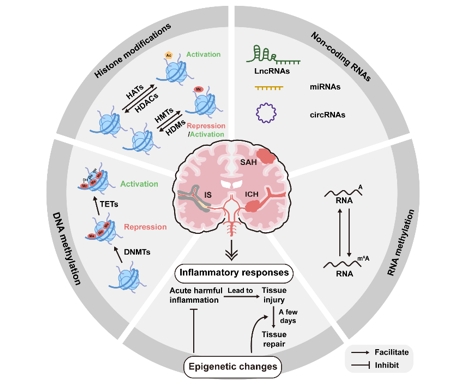中国神经再生研究(英文版) ›› 2025, Vol. 20 ›› Issue (11): 3045-3062.doi: 10.4103/NRR.NRR-D-24-00672
• 综述:神经损伤修复保护与再生 • 下一篇
表观遗传调控脑卒中的炎症反应
Epigenetic regulation of the inflammatory response in stroke
Jingyi Liang1 , Fei Yang2, 3, Zixiao Li4, 5, 6, 7, 8, 9, *, Qian Li3, 10, 11, *
- 1 School of Basic Medical Sciences, Capital Medical University, Beijing, China; 2 Department of Neurobiology, School of Basic Medical Sciences, Capital Medical University, Beijing, China; 3 Laboratory for Clinical Medicine, Beijing Key Laboratory of Neural Regeneration and Repair, Capital Medical University, Beijing, China; 4 Department of Neurology, Beijing Tiantan Hospital, Capital Medical University, Beijing, China; 5 China National Clinical Research Center for Neurological Diseases, Beijing Tiantan Hospital, Capital Medical University, Beijing, China; 6 National Center for Healthcare Quality Management in Neurological Diseases, Beijing Tiantan Hospital, Capital Medical University, Beijing, China; 7 Chinese Institute for Brain Research, Beijing, China; 8 Research Unit of Artificial Intelligence in Cerebrovascular Disease, Chinese Academy of Medical Sciences, Beijing, China; 9 Beijing Engineering Research Center of Digital Healthcare for Neurological Diseases, Beijing, China; 10Department of Biochemistry and Molecular Biology, School of Basic Medical Sciences, Capital Medical University, Beijing, China; 11Beijing Key Laboratory of Cancer Invasion and Metastasis Research, Capital Medical University, Beijing, China
摘要:
脑卒中,包括缺血性脑卒中和出血性脑卒中,其有效治疗手段仍极为有限。大量研究表明,免疫机制是脑卒中后继发性脑损伤发展的关键因素,主要表现为细胞因子释放、血脑屏障破裂、神经细胞死亡,最终导致行为障碍。在实验性脑卒中模型中抑制炎症反应显示了令人鼓舞的效果。然而,脑卒中临床试验中的抗炎治疗则表明,长期免疫抑制未能显示出治疗效果。这可能是由于炎症在损伤和修复中的双重作用,以及脑卒中的复杂病理生理炎症过程,这表明在特定时间点抑制急性有害炎症反应或将表型从促炎症状态转换为修复状态是一个可能的新方向。因此,迫切需要彻底阐明详细的炎症过程,并确定调节脑卒中炎症的相关疗法。近年来,越来越多的研究提示,表观遗传学重编程在不改变DNA序列的情况下调节基因表达,因而能在调节脑卒中损伤炎症方面起到重要的作用。鉴于表观遗传学重编程的可诱导性和可药物性特征,表明其在未来脑卒中护理中的潜在临床应用。因此,此次综述梳理了脑卒中后的炎症反应过程和不同类型的表观遗传作用机制,并就表观遗传调控脑卒中后炎症状态的具体方式进行了阐述,主要关注NF-κB、JAK/STAT、MAPK和炎症小体激活等重要的信号通路调控机制,并进一步探索潜在靶点在预测和治疗脑卒中方面的潜力。通过调节不同时间点炎症诱导的损伤和修复的动态平衡,靶向炎症中的表观遗传调控可能是脑卒中治疗的一种有前景的策略。
https://orcid.org/0000-0002-4713-5418 (Zixiao Li); https://orcid.org/0000-0003-0359-5604 (Qian Li)
